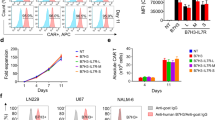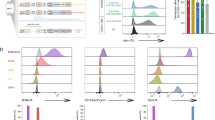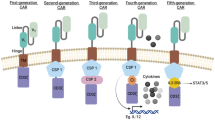Abstract
Purpose
Treatment of breast cancer (BC) by standard methods is effective in the early stage, but ineffective in the advanced stage of disease. To develop an adoptive T cell therapy for advanced and severe BC, we generated fourth-generation chimeric antigen receptor (CAR) T cells targeting folate receptor alpha antigen (FRα) expressed on BC cells, and preclinically evaluated their anti-BC activities.
Methods
The fourth-generation FRα-CAR T cells containing extracellular FRα-specific single-chain variable fragment (scFv) and three intracellular costimulatory domains (CD28, 4-1BB, and CD27) linked to CD3ζ were generated using a lentiviral system, and then were evaluated for their anti-BC activities in two-dimensional and three-dimensional (spheroid) cultures.
Results
When our fourth-generation FRα-CAR T cells were cocultured with FRα-expressing MDA-MB-231 BC cell line at an effector to target ratio of 20:1, these CAR T cells specifically lysed 88.7 ± 10.6% of the target cells. Interestingly, the cytotoxic lysis of FRα-CAR T cells was more pronounced in target cells with higher surface FRα expression. This specific cytotoxicity of the CAR T cells was not observed when cocultured with FRα-negative MCF10A normal breast-like cell line at the same ratio (34.3 ± 4.7%). When they were cocultured with MDA-MD-231 spheroid, the FRα-CAR T cells exhibited antitumor activity marked with spheroid size reduction and breakage.
Conclusion
This proof-of-concept study thus shows the feasibility of using these fourth-generation FRα-CAR T cells for adoptive T cell therapy in BC.






Similar content being viewed by others
Data availability
The datasets generated during and/or analyzed during the current study are available from the corresponding author on reasonable request.
References
Ahmad A (2019) Breast cancer statistics: recent trends. In: Ahmad A (ed) Breast cancer metastasis and drug resistance: challenges and progress. Springer International Publishing, Cham, pp 1–7
Sambi M, Qorri B, Harless W, Szewczuk MR (2019) Therapeutic options for metastatic breast cancer. In: Ahmad A (ed) Breast cancer metastasis and drug resistance: challenges and progress. Springer International Publishing, Cham, pp 131–172
Duffy MJ, Harbeck N, Nap M, Molina R, Nicolini A, Senkus E, Cardoso F (2017) Clinical use of biomarkers in breast cancer: updated guidelines from the European Group on Tumor Markers (EGTM). Eur J Cancer 75:284–298. https://doi.org/10.1016/j.ejca.2017.01.017
Gupta GK, Collier AL, Lee D, Hoefer RA, Zheleva V, Siewertsz van Reesema LL, Tang-Tan AM, Guye ML, Chang DZ, Winston JS, Samli B, Jansen RJ, Petricoin EF, Goetz MP, Bear HD, Tang AH (2020) Perspectives on triple-negative breast cancer: current treatment strategies, unmet needs, and potential targets for future therapies. Cancers (Basel). https://doi.org/10.3390/cancers12092392
Colleoni M, Sun Z, Price KN, Karlsson P, Forbes JF, Thürlimann B, Gianni L, Castiglione M, Gelber RD, Coates AS, Goldhirsch A (2016) Annual hazard rates of recurrence for breast cancer during 24 years of follow-up: results from the International breast cancer study group trials I to V. J Clin Oncol 34(9):927–935. https://doi.org/10.1200/JCO.2015.62.3504
Venetis K, Invernizzi M, Sajjadi E, Curigliano G, Fusco N (2020) Cellular immunotherapy in breast cancer: the quest for consistent biomarkers. Cancer Treat Rev 90:102089. https://doi.org/10.1016/j.ctrv.2020.102089
Antoine P, Maher J (2020) Developing a safe and effective CAR T-cell immunotherapy for breast cancer: progress and pitfalls. Breast Cancer Manag. https://doi.org/10.2217/bmt-2020-0010
Maus MV, Fraietta JA, Levine BL, Kalos M, Zhao Y, June CH (2014) Adoptive immunotherapy for cancer or viruses. Annu Rev Immunol 32(1):189–225. https://doi.org/10.1146/annurev-immunol-032713-120136
Liu X, Zhang N, Shi H (2017) Driving better and safer HER2-specific CARs for cancer therapy. Oncotarget 8(37):62730–62741. https://doi.org/10.18632/oncotarget.17528
Tchou J, Zhao Y, Levine BL, Zhang PJ, Davis MM, Melenhorst JJ, Kulikovskaya I, Brennan AL, Liu X, Lacey SF, Posey AD Jr, Williams AD, So A, Conejo-Garcia JR, Plesa G, Young RM, McGettigan S, Campbell J, Pierce RH, Matro JM, DeMichele AM, Clark AS, Cooper LJ, Schuchter LM, Vonderheide RH, June CH (2017) Safety and efficacy of intratumoral injections of Chimeric Antigen Receptor (CAR) T cells in metastatic breast cancer. Cancer Immunol Res 5(12):1152–1161. https://doi.org/10.1158/2326-6066.cir-17-0189
Adusumilli PS, Zauderer MG, Rusch VW, O’Cearbhaill R, Zhu A, Ngai D, McGee E, Chintala N, Messinger J, Cheema W, Halton E, Diamonte C, Pineda J, Vincent A, Modi S, Solomon SB, Jones DR, Brentjens RJ, Riviere I, Sadelain M (2019) Regional delivery of mesothelin-targeted CAR T cells for pleural cancers: Safety and preliminary efficacy in combination with anti-PD-1 agent. J Clin Oncol 37(15):2511–2511. https://doi.org/10.1200/JCO.2019.37.15_suppl.2511
Wang J, Zhou P (2017) New approaches in CAR-T cell immunotherapy for breast cancer. In: Song E, Hu H (eds) Translational research in breast cancer: biomarker diagnosis, targeted therapies and approaches to precision medicine. Springer, Singapore, pp 371–381
Tokarew N, Ogonek J, Endres S, von Bergwelt-Baildon M, Kobold S (2019) Teaching an old dog new tricks: next-generation CAR T cells. Br J Cancer 120(1):26–37. https://doi.org/10.1038/s41416-018-0325-1
Li D, Li X, Zhou W-L, Huang Y, Liang X, Jiang L, Yang X, Sun J, Li Z, Han W-D, Wang W (2019) Genetically engineered T cells for cancer immunotherapy. Signal Transduct Target Ther 4(1):35. https://doi.org/10.1038/s41392-019-0070-9
Kong W, Lacey SF, Melenhorst JJ, Fraietta JA (2018) Biomarkers in chimeric antigen receptor T-cell therapy. Biomark Med 12(5):415–418. https://doi.org/10.2217/bmm-2018-0054
Kelemen LE (2006) The role of folate receptor alpha in cancer development, progression and treatment: cause, consequence or innocent bystander? Int J Cancer 119(2):243–250. https://doi.org/10.1002/ijc.21712
Kalli KR, Block MS, Kasi PM, Erskine CL, Hobday TJ, Dietz A, Padley D, Gustafson MP, Shreeder B, Puglisi-Knutson D, Visscher DW, Mangskau TK, Wilson G, Knutson KL (2018) Folate receptor alpha peptide vaccine generates immunity in breast and ovarian cancer patients. Clin Cancer Res. https://doi.org/10.1158/1078-0432.Ccr-17-2499
Liu Y, Lian T, Yao Y (2020) A systematic review and meta-analysis of higher expression of folate receptor alpha (FOLR1) predicts poor cancer prognosis. Biomarkers 25(5):367–374. https://doi.org/10.1080/1354750x.2020.1771420
Kandalaft LE, Powell DJ Jr, Coukos G (2012) A phase I clinical trial of adoptive transfer of folate receptor-alpha redirected autologous T cells for recurrent ovarian cancer. J Transl Med 10:157. https://doi.org/10.1186/1479-5876-10-157
Song DG, Ye Q, Poussin M, Chacon JA, Figini M, Powell DJ Jr (2016) Effective adoptive immunotherapy of triple-negative breast cancer by folate receptor-alpha redirected CAR T cells is influenced by surface antigen expression level. J Hematol Oncol 9(1):56. https://doi.org/10.1186/s13045-016-0285-y
Kim M, Pyo S, Kang CH, Lee CO, Lee HK, Choi SU, Park CH (2018) Folate receptor 1 (FOLR1) targeted chimeric antigen receptor (CAR) T cells for the treatment of gastric cancer. PLoS ONE 13(6):e0198347. https://doi.org/10.1371/journal.pone.0198347
Hombach A, Sent D, Schneider C, Heuser C, Koch D, Pohl C, Seliger B, Abken H (2001) T-cell activation by recombinant receptors: CD28 costimulation is required for interleukin 2 secretion and receptor-mediated T-cell proliferation but does not affect receptor-mediated target cell lysis. Can Res 61(5):1976–1982
Song DG, Ye Q, Carpenito C, Poussin M, Wang LP, Ji C, Figini M, June CH, Coukos G, Powell DJ Jr (2011) In vivo persistence, tumor localization, and antitumor activity of CAR-engineered T cells is enhanced by costimulatory signaling through CD137 (4–1BB). Can Res 71(13):4617–4627. https://doi.org/10.1158/0008-5472.Can-11-0422
Song D-G, Ye Q, Poussin M, Harms GM, Figini M, Powell DJ (2012) CD27 costimulation augments the survival and antitumor activity of redirected human T cells in vivo. Blood 119(3):696–706. https://doi.org/10.1182/blood-2011-03-344275
Soule HD, Maloney TM, Wolman SR, Peterson WD Jr, Brenz R, McGrath CM, Russo J, Pauley RJ, Jones RF, Brooks SC (1990) Isolation and characterization of a spontaneously immortalized human breast epithelial cell line, MCF-10. Can Res 50(18):6075–6086
Panya A, Thepmalee C, Sawasdee N, Sujjitjoon J, Phanthaphol N, Junking M, Wongkham S, Yenchitsomanus PT (2018) Cytotoxic activity of effector T cells against cholangiocarcinoma is enhanced by self-differentiated monocyte-derived dendritic cells. Cancer Immunol Immunother. https://doi.org/10.1007/s00262-018-2212-2
Cribbs AP, Kennedy A, Gregory B, Brennan FM (2013) Simplified production and concentration of lentiviral vectors to achieve high transduction in primary human T cells. BMC Biotechnol 13:98–98. https://doi.org/10.1186/1472-6750-13-98
Ai HW, Olenych SG, Wong P, Davidson MW, Campbell RE (2008) Hue-shifted monomeric variants of Clavularia cyan fluorescent protein: identification of the molecular determinants of color and applications in fluorescence imaging. BMC Biol 6:13. https://doi.org/10.1186/1741-7007-6-13
Zhang Z, Wang J, Tacha DE, Li P, Bremer RE, Chen H, Wei B, Xiao X, Da J, Skinner K, Hicks DG, Bu H, Tang P (2014) Folate receptor alpha associated with triple-negative breast cancer and poor prognosis. Arch Pathol Lab Med 138(7):890–895. https://doi.org/10.5858/arpa.2013-0309-OA
Knutson KL, Krco CJ, Erskine CL, Goodman K, Kelemen LE, Wettstein PJ, Low PS, Hartmann LC, Kalli KR (2006) T-Cell Immunity to the folate receptor alpha is prevalent in women with breast or ovarian cancer. J Clin Oncol 24(26):4254–4261. https://doi.org/10.1200/jco.2006.05.9311
Lin J, Spidel JL, Maddage CJ, Rybinski KA, Kennedy RP, Krauthauser CLM, Park YC, Albone EF, Jacob S, Goserud MT, Martinez BP, Chao Q, Zhou Y, Nicolaides NC, Kline JB, Grasso L (2013) The antitumor activity of the human FOLR1-specific monoclonal antibody, farletuzumab, in an ovarian cancer mouse model is mediated by antibody-dependent cellular cytotoxicity. Cancer Biol Ther 14(11):1032–1038. https://doi.org/10.4161/cbt.26106
Vergote I, Leamon CP (2015) Vintafolide: a novel targeted therapy for the treatment of folate receptor expressing tumors. Ther Adv Med Oncol 7(4):206–218. https://doi.org/10.1177/1758834015584763
Farran B, Pavitra E, Kasa P, Peela S, Rama Raju GS, Nagaraju GP (2019) Folate-targeted immunotherapies: passive and active strategies for cancer. Cytokine Growth Factor Rev 45:45–52. https://doi.org/10.1016/j.cytogfr.2019.02.001
Markert S, Lassmann S, Gabriel B, Klar M, Werner M, Gitsch G, Kratz F, Hasenburg A (2008) Alpha-folate receptor expression in epithelial ovarian carcinoma and non-neoplastic ovarian tissue. Anticancer Res 28(6a):3567–3572
O’Shannessy DJ, Somers EB, Maltzman J, Smale R, Fu Y-S (2012) Folate receptor alpha (FRA) expression in breast cancer: identification of a new molecular subtype and association with triple negative disease. SpringerPlus 1:22. https://doi.org/10.1186/2193-1801-1-22
Hartmann LC, Keeney GL, Lingle WL, Christianson TJ, Varghese B, Hillman D, Oberg AL, Low PS (2007) Folate receptor overexpression is associated with poor outcome in breast cancer. Int J Cancer 121(5):938–942. https://doi.org/10.1002/ijc.22811
Ginter PS, McIntire PJ, Cui X, Irshaid L, Liu Y, Chen Z, Shin SJ (2017) Folate receptor alpha expression is associated with increased risk of recurrence in triple-negative breast cancer. Clin Breast Cancer 17(7):544–549. https://doi.org/10.1016/j.clbc.2017.03.007
Aboulhagag NAE, Torky RF, Fadel SA (2018) Folate receptor α is associated with poor clinicopathological perspectives in breast carcinoma. Pathophysiology 25(1):71–76
Xu D, Jin G, Chai D, Zhou X, Gu W, Chong Y, Song J, Zheng J (2018) The development of CAR design for tumor CAR-T cell therapy. Oncotarget 9(17):13991–14004. https://doi.org/10.18632/oncotarget.24179
Vergote I, Armstrong D, Scambia G, Teneriello M, Sehouli J, Schweizer C, Weil SC, Bamias A, Fujiwara K, Ochiai K, Poole C, Gorbunova V, Wang W, O’Shannessy D, Herzog TJ (2016) A randomized, double-blind, placebo-controlled, phase III study to assess efficacy and safety of weekly farletuzumab in combination with carboplatin and taxane in patients with ovarian cancer in first platinum-sensitive relapse. J Clin Oncol 34(19):2271–2278. https://doi.org/10.1200/JCO.2015.63.2596
Davis HE, Morgan JR, Yarmush ML (2002) Polybrene increases retrovirus gene transfer efficiency by enhancing receptor-independent virus adsorption on target cell membranes. Biophys Chem 97(2–3):159–172. https://doi.org/10.1016/s0301-4622(02)00057-1
Sadelain M (2016) Chimeric antigen receptors: driving immunology towards synthetic biology. Curr Opin Immunol 41:68–76. https://doi.org/10.1016/j.coi.2016.06.004
Sadelain M, Brentjens R, Rivière I, Park J (2015) CD19 CAR therapy for acute lymphoblastic leukemia. Am Soc Clin Oncol Edu Book 35:e360–e363. https://doi.org/10.14694/EdBook_AM.2015.35.e360
Porter DL, Hwang W-T, Frey NV, Lacey SF, Shaw PA, Loren AW, Bagg A, Marcucci KT, Shen A, Gonzalez V, Ambrose D, Grupp SA, Chew A, Zheng Z, Milone MC, Levine BL, Melenhorst JJ, June CH (2015) Chimeric antigen receptor T cells persist and induce sustained remissions in relapsed refractory chronic lymphocytic leukemia. Sci Transl Med. https://doi.org/10.1126/scitranslmed.aac5415
Ghassemi S, Bedoya F, Nunez-Cruz S, June C, Melenhorst J, Milone M (2016) Shortened T cell culture with IL-7 and IL-15 provides the most potent chimeric antigen receptor (CAR)-modified T cells for adoptive immunotherapy. Mol Ther. https://doi.org/10.1016/S1525-0016(16)33012-X
Mamonkin M, Rouce RH, Tashiro H, Brenner MK (2015) A T-cell-directed chimeric antigen receptor for the selective treatment of T-cell malignancies. Blood 126(8):983–992. https://doi.org/10.1182/blood-2015-02-629527
Benmebarek M-R, Karches CH, Cadilha BL, Lesch S, Endres S, Kobold S (2019) Killing mechanisms of chimeric antigen receptor (CAR) T cells. Int J Mol Sci 20(6):1283. https://doi.org/10.3390/ijms20061283
Hong LK, Chen Y, Smith CC, Montgomery SA, Vincent BG, Dotti G, Savoldo B (2018) CD30-redirected chimeric antigen receptor T cells target CD30(+) and CD30(-) embryonal carcinoma via antigen-dependent and Fas/FasL interactions. Cancer Immunol Res 6(10):1274–1287. https://doi.org/10.1158/2326-6066.Cir-18-0065
Chang L-J, Dong L, Liu Y-C, Tsao S-T, Li Y-C, Liu L, Gao Z, Tan X, Lu D-P, Zhang J-P, Wang J-B, Ying Y-M, Zhang L-P, Zheng H, Wang K, Zheng X-L, Wang H-X, Lai X, Li D (2016) Safety and efficacy evaluation of 4SCAR19 chimeric antigen receptor-modified T cells targeting B cell acute lymphoblastic leukemia–three-year follow-up of a multicenter phase I/II study. Blood 128(22):587–587. https://doi.org/10.1182/blood.V128.22.587.587
Zhang J-P, Zhang R, Tsao S-T, Liu Y-C, Chen X, Lu D-P, Castillo P, Chang L-J (2018) Sequential allogeneic and autologous CAR-T-cell therapy to treat an immune-compromised leukemic patient. Blood Adv 2(14):1691–1695. https://doi.org/10.1182/bloodadvances.2018017004
Kawalekar OU, O’Connor RS, Fraietta JA, Guo L, McGettigan SE, Posey AD Jr, Patel PR, Guedan S, Scholler J, Keith B, Snyder NW, Blair IA, Milone MC, June CH (2016) Distinct signaling of coreceptors regulates specific metabolism pathways and impacts memory development in CAR T cells. Immunity 44(2):380–390. https://doi.org/10.1016/j.immuni.2016.01.021
Elahi R, Khosh E, Tahmasebi S, Esmaeilzadeh A (2018) Immune cell hacking: challenges and clinical approaches to create smarter generations of chimeric antigen receptor T cells. Front Immunol 9:1717. https://doi.org/10.3389/fimmu.2018.01717
Hu W, Zi Z, Jin Y, Li G, Shao K, Cai Q, Ma X, Wei F (2019) CRISPR/Cas9-mediated PD-1 disruption enhances human mesothelin-targeted CAR T cell effector functions. Cancer Immunol Immunother 68(3):365–377. https://doi.org/10.1007/s00262-018-2281-2
Acknowledgements
We thank Miss Wannasiri Chiraphabpiboon and Miss Pucharee Songprakon for technical assistance; Professor Dr. Lung-Ji Chang, University of Florida, USA for insightful comments and suggestions; Professor Dr. Peter Hokland, Aarhus University, Denmark for critical reading of and providing comments on our manuscript; and, Kevin Jones for reading and editing the final version of the manuscript.
Funding
This work was financially supported by research grants from the Thailand Research Fund (TRF) (grant numbers: IRN58W0001 and IRN5801PHDW01), the Siriraj Research Fund, Faculty of Medicine Siriraj Hospital, Mahidol University (grant number: R016333030 and R016034008), and the Center of Excellence on Medical Biotechnology (CEMB), The S&T Postgraduate Education and Research Development Office (PERDO), The Commission on Higher Education (CHE), Thailand (grant number: CB-61–006-01). MJ, CT, and PY were also supported by Chalermphrakiat Grants from the Faculty of Medicine Siriraj Hospital, Mahidol University.
Author information
Authors and Affiliations
Contributions
PL conducted experiments, performed data collection and analysis, interpreted the results, and drafted the manuscript. YW partly assisted with experimental studies and data analysis. PL, MJ, JS, CT, and PY conceptualized, designed, and planned the experimental studies, interpreted data, and revised and edited the manuscript.
Corresponding authors
Ethics declarations
Conflict of interest
All authors declare that they have no conflicts of interest.
Ethical approval
All procedures performed in studies involving human participants were in accordance with the ethical standards of the institutional research committee and with the 1964 Helsinki declaration and its later amendments or comparable ethical standards. Ethical approval of this study was granted by Siriraj Institutional Review Board (SIRB) of the Faculty of Medicine Siriraj Hospital, Mahidol University, Bangkok, Thailand (COA no. Si 267/2020).
Informed consent
Informed consent was obtained from all individual participants included in the study.
Additional information
Publisher's Note
Springer Nature remains neutral with regard to jurisdictional claims in published maps and institutional affiliations.
Supplementary Information
Below is the link to the electronic supplementary material.
Rights and permissions
About this article
Cite this article
Luangwattananun, P., Junking, M., Sujjitjoon, J. et al. Fourth-generation chimeric antigen receptor T cells targeting folate receptor alpha antigen expressed on breast cancer cells for adoptive T cell therapy. Breast Cancer Res Treat 186, 25–36 (2021). https://doi.org/10.1007/s10549-020-06032-3
Received:
Accepted:
Published:
Issue Date:
DOI: https://doi.org/10.1007/s10549-020-06032-3




